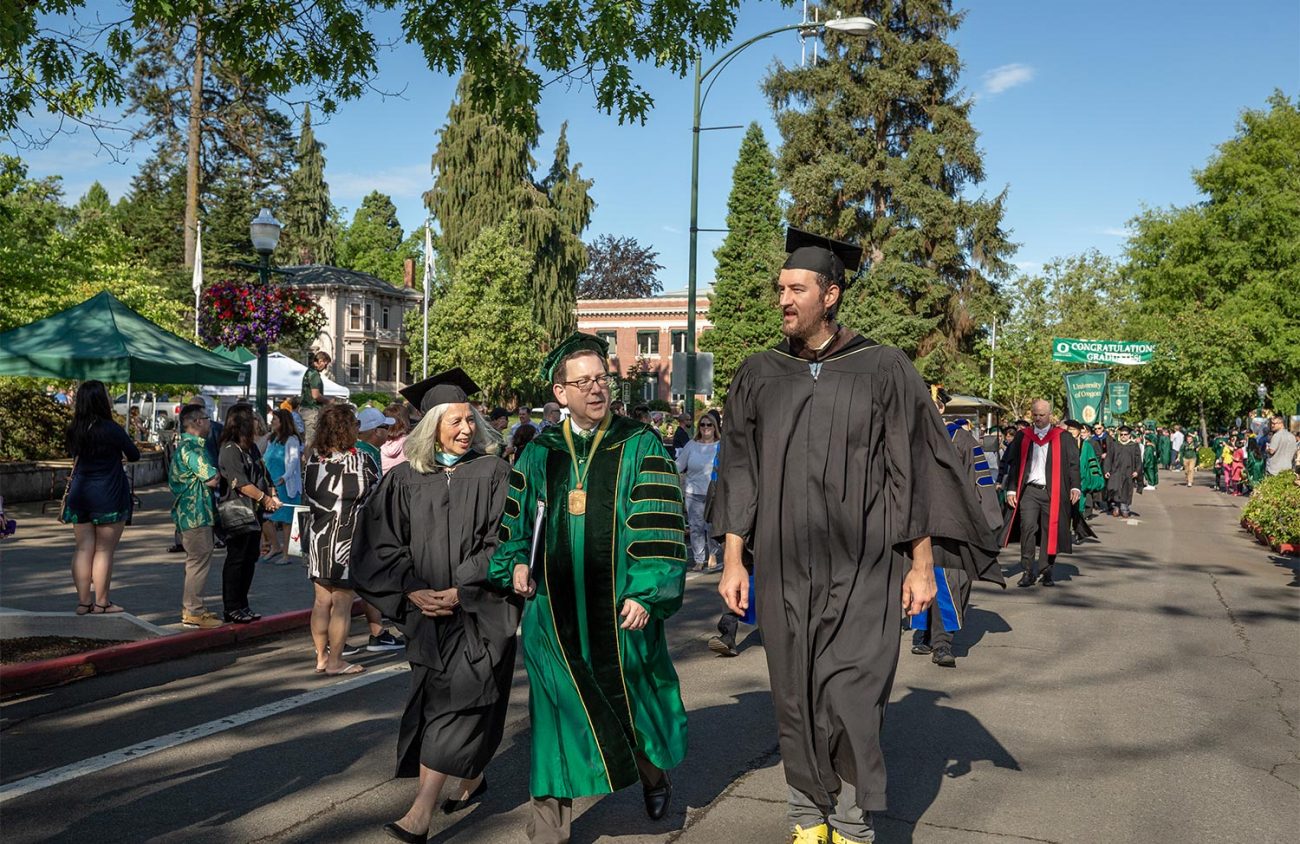Back in 1982 Miguel McKelvey’s mother, Lucia McKelvey, and a group of friends founded What’s Happening, the newspaper that would go on to become Eugene Weekly.
Some 36 years later, Miguel walked onto the stage at Matthew Knight Arena as the 2018 University of Oregon commencement speaker.
Those events, in some ways, are related.
Miguel McKelvey is the co-founder of WeWork, a shared office-space company with locations across the globe that was valued at $20 billion last August. He grew up in Eugene in what he describes as a matriarchal collective, graduating from South Eugene high in 1992 and from the UO with a degree in architecture in 1999.
Of his mother, McKelvey says that her “expectations were really alternative — there was nothing I was supposed to do in my life.”
After graduation, McKelvey went to Japan, which led to co-founding the English-learning networking site English, baby! and later, after a stint at a small architecture firm, he co-founded WeWork, where he is chief culture officer.
Introducing him at the UO commencement, President Michael Schill called him a “visionary” and “one of the most innovative entrepreneurs of our time.”
McKelvey kept students rapt during his speech, telling stories about growing up in Eugene and recalling an episode of dealing with rats after he moved to New York City. Being in magazines and newspapers weren’t as fulfilling as the process of figuring out that rat problem. It’s not just external validation, he said, emphasizing a theme of doing what you are passionate about and finding meaning in what you do.
“We’re all weirdos in our own way,” he told the cheering sea of green-clad graduates.
“There’s no ‘making it,’” he said. “No matter if you are the founder of a billion-dollar company, no matter what. I’m never going to make it. There’s no such thing as ‘making it.’”
This is, McKelvey said, “because as soon as you think you have it figured out, as soon as you have your shit together and your life is moving in the right direction, something is going to come and turn it all around and flip it upside down and you’re going to have to figure it out all over again.”
That is scary, he said, “but also amazing,” as you get to re-invent yourself over and over again.
In an interview after his speech, McKelvey says of coming back to Eugene, “I do think when I was 16, I was pretty specific in what I thought would happen” — be a business major, get an MBA, become a stockbroker and be married with two kids by 26.
“I had it all pretty figured out,” he adds, “and it’s crazy how quickly that whole premise comes crashing down.”
McKelvey did wind up becoming an entrepreneur, he points out, but that was through studying design as well as the empathy and problem solving he learned in architecture school.
And how did growing up with a mother who founded a newspaper because she and her friends had a passion affect the entrepreneur McKelvey became?
“I think about that a lot,” he says, “because I do believe my framework and expectations of myself were completely different from most people.”
Lucia McKelvey and her small group of friends were creating something for themselves based not only on what they believed in but also on what they enjoyed — community, arts and political activism.
“That’s an ideal way to exist in the world — living and working in a way that supports your values,” he says, not only the way you impact the world, but also they way it affects you internally.
But why in the world, even in 1982, would you name a newspaper “What’s Happening?”
He laughs, “It wasn’t like they had some grand plan. It was very literal. It was a list of what’s happening.”
“They just did something that came naturally,” he says. Few people get that opportunity, that room, that time, that space. “WeWork is a safe place for that to happen,” he says.
WeWork has recently committed to hiring 1,500 refugees. When asked how other startups and businesses in Eugene and elsewhere can give back to their communities, McKelvey explains that the way to give back is to find an “authentic use of your energy” and connection to what your expertise is — to leverage your skills in way that’s impactful.
It’s not only important to find your passion in your work, but also in how you give back, he says. For the refugee program, it wasn’t a top-down decision at the company but one that came from the bottom. “We empowered them to do it.”
He adds, “The reason why that works is because our team is passionate about it.”
